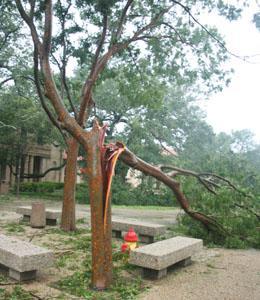Hurricane Gustav left the Quad with uprooted trees, the University Student Recreation Complex saturated and some students in the dark for more than a week.Estimates have the cost of University property damage from Gustav at $10,011,740. The cost of University response efforts such as the PMAC, which served as a medical special needs shelter, is estimated at $2,752,812. In the three months since Gustav made landfall, University officials have assessed and reassessed damage and are busy preparing for the future — all while students dealt with Saturday classes, a parish-wide curfew and a bizarre start to the football season. ACADEMIC CALENDAR, FOOTBALL SEASONWith students missing a week of class after Gustav hit Baton Rouge on Sept. 1, the Office of Academic Affairs and the University Emergency Operations Center announced several changes to the academic calendar Sept. 8. Fall break, originally scheduled for Oct. 9 and 10, was canceled, and Saturday classes were scheduled to make up for lost class time. “We didn’t sign up for classes on Saturdays,” said Michael Hauck, construction management senior. “Saturday is my day to take care of my house and spend time with my family.”Bizarre beginnings carried over to football season. The Aug. 30 game against Appalachian State University kicked off at an early 10 a.m. and the matchup against Troy scheduled for Sept. 6 was moved to Nov. 15.EOC DRAFT REPORTOriginally projected to be completed by mid-October, the Emergency Operations Center’s After Action Report is still in its draft stage.D’Ann Morris, interim director of the EOC, compiled the report and presented the draft to the EOC Core Committee on Thursday. The report outlines “lessons learned” in the EOC’s handling of Hurricane Gustav. The report has taken longer than expected to compile because the report was expanded to include input from numerous departments on campus. The EOC, fully operational since June 2006, comprises two teams — a purple team and a gold team — each with 11 individuals from different departments on campus. The EOC is “activated” during emergencies, and each team works 12-hour shifts. The Core Committee oversees the two teams.Modeled after FEMA’s National Incident Management System, Morris said the EOC functions like a “clearing house.” “The EOC was able to take information in [about] what resources were out there and then channel those resources in the appropriate manner because we knew what the needs were,” Morris said. Serving as a centralized information and coordination center during emergencies, the EOC was established after Hurricane Katrina in 2005. Morris said because of the EOC the University is much more prepared for disasters like Gustav.”The University has functioned for a very long time without an EOC,” Morris said. “Our hope is that, during a crisis, it’ll function much better.” One “lesson learned” discussed in the draft report is the need to change the Cogeneration Plant’s operation plan. Currently, the generator functions to power as much of the campus as possible, but the EOC is working with Facility Services to channel that power to the PMAC and the Carl Maddox Field House first because they serve as medical and special needs shelters during emergencies. The University’s three redundancies of power — Entergy, the Cogeneration Plant and FEMA-provided generators — all failed during Gustav. Morris said the EOC is exploring the possibility of adding a fourth energy source, like natural gas and dual-fuel generators. The key will be keeping those generators running.The draft report stresses the need for a generator manager, who would be responsible for taking inventory of generators and keeping them fueled. The University was without any type of power for six hours and without Entergy power for three days. The Cogeneration Plant was able to provide power to several places on campus, but it can’t support the entire campus. “That was a hard lesson learned,” Morris said. “We had not braced ourselves for the possibility of losing three levels of redundancy in power.”—-Contact Kyle Bove at kbove@lsureveille.com
EOC Report still in draft stage
December 7, 2008

The EOC’s After Action Report is still in the draft stage. The report was originally supposed to be finished in mid-October.



